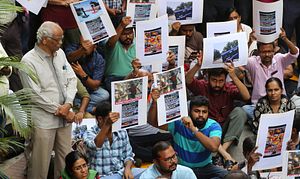The fight over natural resources and land has become the new normal in India, whose quest to become a superpower in the world is costing people their lives and livelihoods. In a direct conflict with the government and corporations, people are coming out on the streets, but only to be beaten up, arrested, silenced, or even killed.
A case in point is the southern state of Tamil Nadu, where local resistance to a copper plant is being met with brutal police force under the state administration of the All India Anna Dravida Munnetra Kazhagam (AIADMK) party and being tacitly backed by the central government led by the right-wing Bharatiya Janata Party (BJP).
On May 22, the 100th day of peaceful protests against the U.K.-based Vedanta’s Sterlite Copper Smelter Plant in the port town of Tuticorin, at least 13 peaceful protesters were killed in police firing as they, along with tens of thousands of residents, were marching to the district collector’s office with a petition. One of the victims was a schoolgirl.
Local authorities had imposed Section 144 – which prohibits assembly of more than four people in that area – without any public announcement. Snipers were used to kill the protesters, instead of an attempt to disperse the crowd with the use of tear gas, water cannons, or rubber bullets. Media pictures showed a man standing atop a police vehicle pointing his gun at the protesters.
For years, locals had complained that the plant was the single-point source of air, ground, and water pollution in the area, creating serious health conditions for the residents of Tuticorin. Young children have suffered from bouts of stomach disorders, while economically strapped villagers have been forced to buy mineral water from the market.
Though there hasn’t been any official study, locals allege that cancer, lung diseases, heart ailments, skin and respiratory diseases are rampant across the area, especially in villages and residential areas around the plant. Many residents have white patches on their bodies, which spreads in shapeless forms all across the body – locals call it the “Sterlite Patch.”
Doctors in the neighborhood and nearby towns have advised the people to move to other towns. People from outside the area are refusing to get their sons and daughters married into a family that lives in Tuticorin.
The crisis had been simmering for the past two decades but the local government refused to find a solution, despite several petitions and appeals by residents.
While the media coverage of the protests and the killings compelled the Tamil Nadu government to order the “permanent” closure of the Vedanta’s Sterlite plant, police repression carries on. The draconian National Security Act (NSA), which empowers the central or state governments to detain a person for a prolonged period on mere suspicion and makes it almost impossible for detainees to get a bail, is being slapped on scores of local young men, even boys.
Police, often in plain-clothes, have allegedly been barging into house after house, picking up young men indiscriminately without an arrest warrant, assaulting and beating them for hours often in police vans and undisclosed locations, and filing false cases with no evidence. Some of the men taken to police stations have reportedly been beaten up for hours, often tied to windows with no food, medicine, or water. In one incident, a 2-year-old girl was thrown to the wall, and her 5-year-old brother was stamped on the chest with boots in the Anna Nagar locality in Tuticorin, a witness told The Diplomat.
For the first time ever, the Tuticorin Bar Council intervened urgently and the district court judge heard cases till late in the night to release hundreds of detainees, including minors. In one instance, police had picked up 94 youngsters and hidden them in a firing range, while a magistrate searched for them in police stations. Finally, the magistrate found them limping with swollen limbs and bodies, having had no food, water, or medicine for more than 24 hours.
While the state government has backed the police action, Prime Minister Narendra Modi has remained silent on the killings and the repression. A tense Tuticorin remains on the edge, with hundreds of injured residents reportedly hiding, not even going to the hospitals due to the fear of arrest, or fleeing the town.
It is widely believed that the local administration and the local police work in tandem with the Vedanta group of industries. Environmentalists believe that since Vedanta has deep pockets, political parties and governments often look the other way even in the face of serious environmental violations.
Therefore, residents fear that Vedanta would challenge the government order for the closure of its plant in Tuticorin after the issue fades from the media headlines, just as the natural resource company appears to be planning to revive its mining project in Niyamgiri – an ecological hot spot in western Odisha state inhabited by ancient tribal communities – which was stopped by the Supreme Court of India after protracted protests, including mass protests in London and other parts of the world.
Vedanta’s eventual success or failure would tell us whether India is seeking to develop the country for the people or at their expense.
Amit Sengupta writes for StoriesAsia.

































